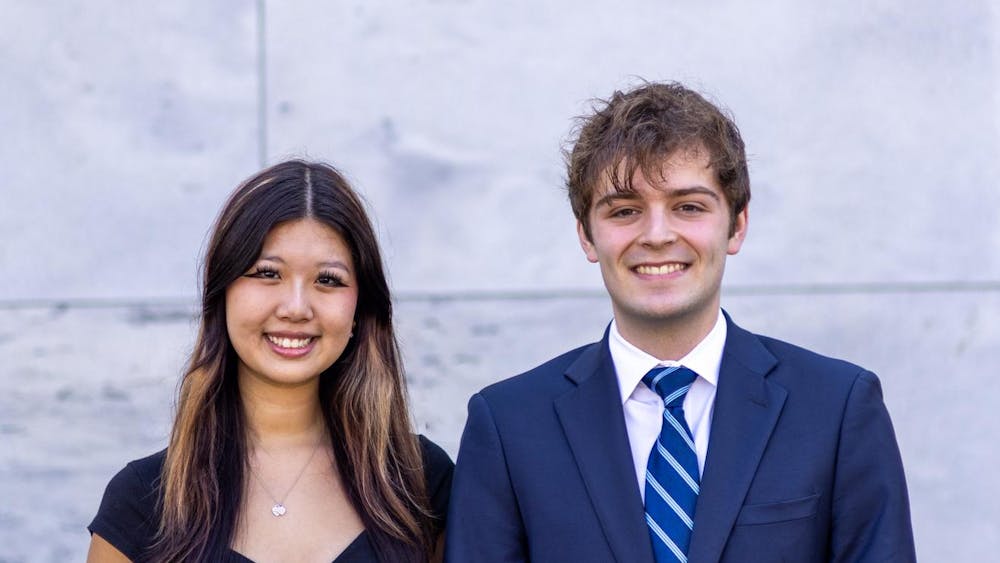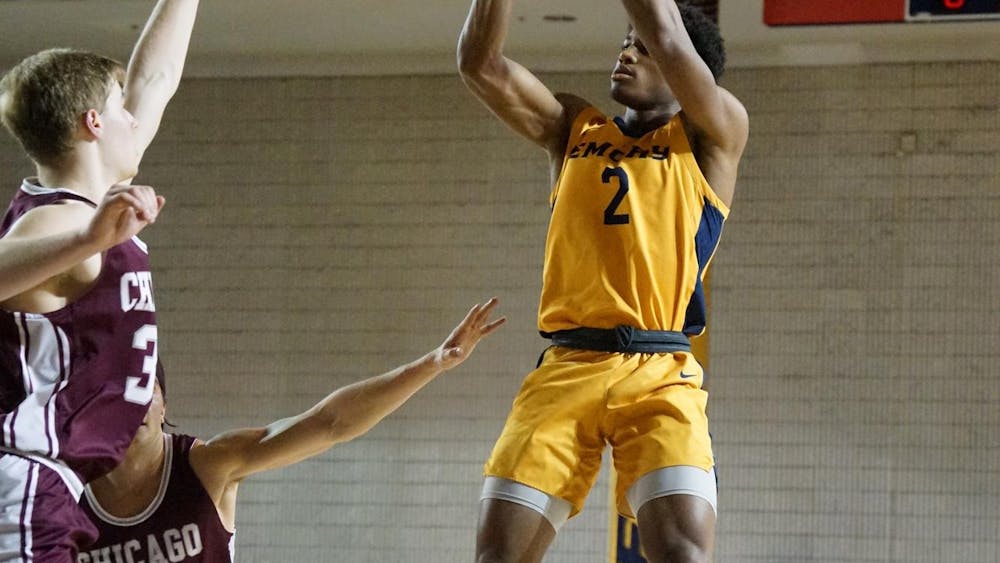This article is the first part in a series of stories about conservatism on Emory’s campus. Follow emorywheel.com and our upcoming print issues for future segments.
As competitive presidential and Senate elections in Georgia ushered in a record degree of political engagement among students, Emory conservatives are navigating a highly charged campus.
Today, students and professors alike point to a dichotomy between the Emory’s robust open expression policy that formally protects speech on campus and overwhelming social pressures that shame conservative expression.
Emory College Republicans (ECR) President Jasmine Jaffe (22C) noted that former President Donald Trump was particularly divisive, saying that ECR members voted for both President Joe Biden and Trump in the 2020 election. Even with Trump out of office, she doubts cross-ideological dialogue at Emory will become easier in the short-term.
“A lot of people who are on the right are still very hesitant to talk to people on the left because no matter what, they’re going to imagine Trump and imagine just vile things about people on the right,” Jaffe said. “So I’m not very optimistic.”
Physical representations of political tensions last manifested on campus months ago when pro-Trump chalkings authored by “Underground Republicans” appeared on the Oxford campus on Election Day. Oxford campus currently lacks an official Republican student organization.
Political chalkings have a history at Emory — pro-Trump chalkings appeared on Emory’s Atlanta campus in 2016, which thrust the University’s then three-year-old open expression policy into a national debate about free speech on college campuses.
When students discovered the chalkings and a Trump sign hanging from a tree at Oxford last November, they washed, burned and threw them away.
Dean of Oxford College Douglas Hicks wrote in a Nov. 4, 2020 email to Oxford students, staff and faculty that “Oxford is a community where important conversations are supported and encouraged,” linking to the University's open expression policy.
Oxford’s Residential Education and Services did not identify who removed the messages, Director of Communications Cathy Wooten wrote in a Jan. 18 email to the Wheel.
Oxford Young Democrats Executive Board member Madden Tullis (22Ox) said the club condemned the chalkings’ content but supported the University’s open expression policy, noting the messages represented an unwillingness for open debate.
“That is really a symbol of the University’s lack of actual discourse happening” Tullis said of the sidewalk messages.
Students struggle to openly share views
Paul Chillemi (22Ox) recalled friends, then unaware of his conservative political views, “screaming” about states voting Republican on election night.
Chillemi’s Christian high school had what he described as a “right lean” with room for ideologically diverse social circles — an atmosphere he described as starkly different from Oxford.
“Going to college … was kind of a shock to me,” Chillemi said. “I knew it was coming, I expected it, but I still don’t think I was prepared to be kind of in the face of constant opposition.”
With friends, Chillemi said he was initially “terrified” of openly expressing his opinions, at times backpedaling comments by claiming they were meant as jokes. Although he still remains “very selective” about what he says, his social circle prioritizes friendship over disagreement.
“If I didn’t have friends across the aisle at Oxford, I don’t think I would have friends,” Chillemi said.
Professor of Sociology and ECR adviser Frank Lechner explained that while campus culture depends on changing student bodies, he thinks Emory is part of a national shift toward limited political discourse.
“It is important to cultivate space for alternative views, if only for the majority view to be tested,” Lechner said. “I do think that we run a risk at Emory, and perhaps in American higher education, of assuming that there is one right way to think about a wide range of issues.”
The Emory Whig, founded by former Wheel opinion writer Robert Schmad (23C) in November, lists its mission as providing means for students to voice their “unadulterated beliefs,” creating “good faith political discourse” and establishing a platform for students to read “well-reasoned, conservative arguments.”
Conservative students who spoke to the Wheel said they view Emory’s student body as skewed heavily left. A 2016 Wheel survey found that 61.78% of respondents had a favorable view of Hillary Clinton as compared to 5.25% for Trump.
Colin Stelmach (22C), who identifies as a libertarian-leaning conservative, said he’s wary of what he says outside of his conservative-leaning inner circle for fear of “being labeled as an other.”
“You say one thing, people might take it out of context, post it online, make a statement about you, and that can be very damaging,” Stelmach said. “You feel that you have to be very careful with what you say as to not upset anybody, even if you don’t think that your views should be upsetting.”
Jaffe said many ECR members find themselves the only conservative students in their social circles and typically avoid talking politics. If students are vocal about their views, especially on social media, Jaffe said they aren’t often met with room for discussion.
“Their friends will do one of two things: they will completely abandon them, and they will no longer have them as a friend, or their friends will just [say] ‘Oh ok, that’s interesting,’ but they don’t really want to get into the nitty gritty in terms of policy,” she said.
Emory’s Open Expression Policy
Chair of Emory’s Open Expression Committee and Associate Professor of Law Alexander Volokh explained that while private universities are “free to be as restrictive as they like,” Emory’s open expression policy grants “quasi-First Amendment protections.”
The Committee writes opinions on events brought forward by community complaints or independent investigations. Enforcement falls on Campus Life or student conduct departments. In the case of the Oxford chalkings, college administration delivered a response without committee recommendation.
Assistant Vice President of Campus Life Suzanne Onorato said the department takes an “educational approach” when enforcement is required, spreading awareness of the policy itself through means such as providing chalk and encouraging students to write their own messages.
Some students have lauded the University's open expression policy, though conservative students perceived University administrators as liberal-leaning. Former ECR President Christian Zimm (15Ox, 17C, 20B, 20L) evidenced former University President Claire Sterk’s filing amicusbriefs against the Trump administration and recalled a resulting productive conversation between ECR leadership and Sterk.
Emory’s Board of Trustees 2020 election cycle donations, by comparison, were overwhelmingly Republican, with 67% of donations going to Republican campaigns and PACs.
Stelmach pointed to widespread backlash to ECR’s decision to invite speaker Heather Mac Donald to speak on campus in January 2020 as an example of students’ unwillingness to engage. He noted that during the talk a student screamed at Mac Donald, “trying to silence her.”
“She definitely said some things that even I don’t agree with and I’m sure most people didn’t agree with, [but] I didn’t think that she was openly attacking anybody,” Stelmach said.
Mac Donald received significant backlash from audience members when she spoke against affirmative action and claimed that “the vast majority of what is called campus rape [are] voluntary hookups.”
Jaffe said ECR was unprepared for the amount of “pushback” the event received. She pointed to Michael Knowles’ 2019 Emory visit as relatively more controversial in the content of his speech and credited the public response to Mac Donald to ECR’s growing profile since reforming in 2018.
Conservative community members acknowledged students’ prerogative to protest. However, they believe that limiting speech arbitrarily could limit a range of views and ostracize conservative students.
Though Chillemi began college with an open mind about his beliefs, he stated that withstanding backlash solidified his conservative views.
“I think it showed me like I really do believe what I believe not just because of who I was surrounded by,” he said.
Jaffe noted that liberal student groups have “rejected” ECR’s requests to engage in debates, stating such groups have said they “don’t want to legitimate our policy or us as an organization.”
Jaffe specified two occasions: a debate with Emory International Relations Association (EIRA) about former President Barack Obama and Trump’s foreign policy and a debate coordinated through Emory Votes Initiative with the Young Democrats of Emory.
EIRA President Wendy Avilés (22C) told the Wheel that EIRA “couldn’t produce two organizations to discuss the issue,” and the event became an internal general body debate. Young Democrats President Alex Chanen (21C) said the organization was focused on organizing students around election issues at the time.
TableTalk is a student group that promotes challenging discussions and debates across campus. Co-Presidents Sabrina Flores (21C) and Brennan Dyson (21C) said while the club has adjusted to an online format, its mission remains important amid what Dyson described as a “chasm” between political parties.
“Perhaps it makes you uncomfortable and perhaps it makes you angry … but all in all, I also think that understanding the other aisle can make both of your arguments stronger,” Flores said.
While Jaffe’s term as ECR president ends in April, she said she would continue to support ECR in the face of hostility.
“My hope for the club is to just grow our membership, bring conservative voices and values to campus where they’re often drowned out by people on the left that have a more dominant space,” Jaffe said.








